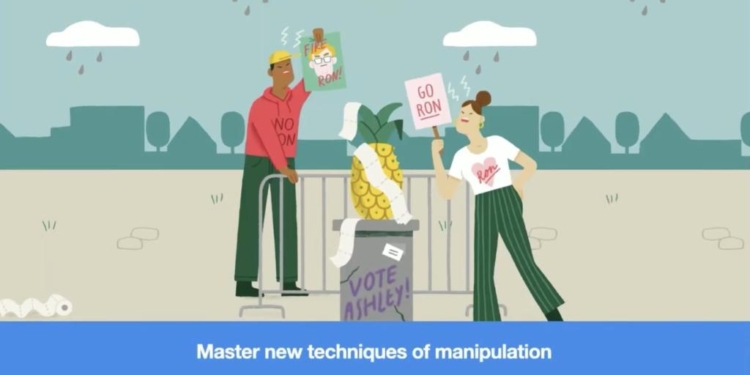From a nearly $1 billion Pentagon contract to Uzbek-language stage musicals lampooning “fake news,” a newly released database reveals the federal government’s multi-agency, $1.4 billion push to stamp out “mis-, dis- and malinformation.”
The searchable trove — compiled by transparency watchdog liber-net — catalogs more than 850 grants and contracts issued since 2010 to universities, nonprofits, contractors and foreign groups, all under the banner of curbing harmful content. While many awards fund routine research of public health campaigns, several stand-outs illustrate how expansive the government’s information war budget has become.
“The Department of Defense has awarded a task order worth up to $979 million over a five-year period to Peratron [a defense contractor] to counter misinformation from U.S. adversaries,” the contract notice states.
Censorship industrial complex https://t.co/s0L0BxsMw5
— gorklon rust (@elonmusk) February 11, 2025
The Peraton task order, issued in 2021 for U.S. Central Command, alone accounts for roughly two-thirds of the spending identified so far. The Pentagon said the contractor would provide “operational planning, implementation and assessment services,” but the publicly available description offers few specifics beyond that scope.
At the other end of the spectrum, the U.S. Agency for International Development’s (USAID) Central Asia Media Program financed journalist trainings, documentary-film schools — and two original Uzbek-language stage shows titled “Victims of False Information” and “Facts Against Opinions,” conceived as musical PSAs to teach critical news skills.
State Department money has gone to smaller cultural projects as well. A $42,000 award sent Bosnian teenagers to an inter-ethnic “Knowledge Against Misinformation” debate camp that mixed critical thinking workshops with sports and music activities aimed at building unity.
“To increase mutual understanding, combat hate speech and foster positive messaging about shared identity among youth in [Bosnia and Herzegovina] via participation in an interethnic camp,” the project’s description reads.
One micro-grant — just $3,000 — paid a Slovenian kids’ magazine to launch a “Free Online Newspaper for Children to Fight Disinformation,” promising custom news content tailored for elementary school-aged readers. Another $1,500 check covered a Slovenian translation of the Dutch browser game “Harmony Square,” whose gameplay teaches players to seed conspiracies so they can later recognize them in real life.
Taken together, these awards underscore the breadth of Washington’s information control effort: mammoth defense contracts, region-specific media productions, youth camps and even video game localizations share the same federal objective of shaping how audiences process contested claims.
Liber-net’s dataset suggests the overall price tag tops over $1.4 billion, with the State Department issuing the greatest number of awards and the Pentagon writing the largest checks. Grant descriptions routinely cite election security, vaccine hesitancy and foreign propaganda as justification, though agencies differ sharply in their tactics — from artificial intelligence surveillance tools to community theater.
The database arrives amid intensifying scrutiny of government-social-media coordination. House Judiciary Committee investigators have subpoenaed multiple universities over disinformation research contracts, arguing that federally funded projects risk sliding into viewpoint policing.
“The entanglement of Executive Branch agencies, third-party organizations and technology companies to moderate speech-related content online raises questions about the extent to which these actions affected the civil liberties of American citizens,” Republican Ohio Rep. Jim Jordan, chair of the Judiciary Committee, said in a 2023 statement.
President Trump and Elon Musk are protecting the American people from censorship and government waste.
No wonder Democrats are so upset!
— Rep. Jim Jordan (@Jim_Jordan) February 13, 2025
Liber-net director Andrew Lowenthal said the public spreadsheet will be updated as new awards surface and welcomes challenges to any entry. The group has also published its scraping methodology and direct links to federal spending records so readers can verify each line item for themselves.
“I think there’s actually several dozen stories in there for anyone,” he said. “And this would be an invitation to anyone out there… what was this project? Who are these people? What are they doing during this time? Each one actually deserves a thousand words on it, or at least half of them do, because there’s some really bizarre kind of thinking around a lot of the activities that people were undertaking.”
For taxpayers, the database offers a first-hand look at how agencies — from the Centers for Disease Control (CDC) to the U.S. Agency for International Development (USAID) — have quietly rebranded everything from camp sing-alongs to cybersecurity contracts as battles in the information war. Whether Congress reins in those efforts or expands them further, the ledger chronicling their existence is now navigable.
All content created by the Daily Caller News Foundation, an independent and nonpartisan newswire service, is available without charge to any legitimate news publisher that can provide a large audience. All republished articles must include our logo, our reporter’s byline and their DCNF affiliation. For any questions about our guidelines or partnering with us, please contact [email protected].



























 Continue with Google
Continue with Google